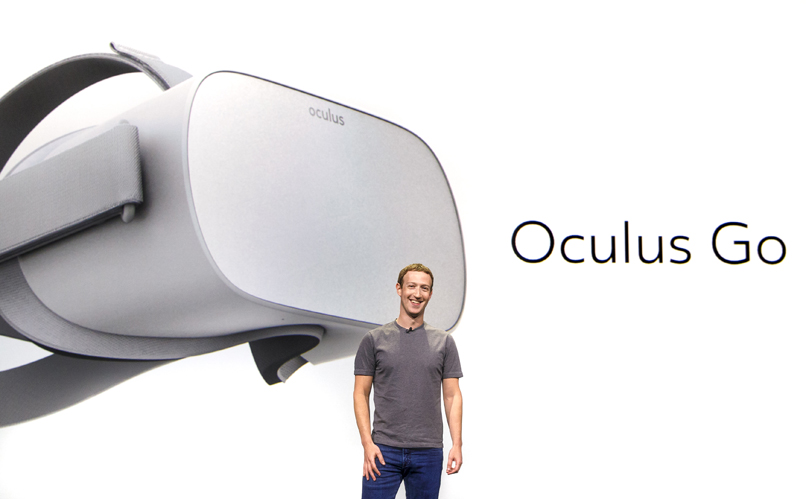 EMERGING TECH
EMERGING TECH
 EMERGING TECH
EMERGING TECH
 EMERGING TECH
EMERGING TECH
In a sign that virtual reality is finally poised to enter the mainstream, Facebook Inc. today revealed plans for a $199 standalone VR headset called Oculus Go that will be on the market early next year.
Oculus, which Facebook bought for $2 billion in 2014, revealed the Go (pictured) and other hardware and software advances as well as future plans at its fourth annual Oculus Connect conference running today and tomorrow in San Jose, California.
The $199 price for the Go, which unlike the lower-end, Oculus-powered Samsung Gear VR doesn’t require inserting a smartphone into the headset, is not a complete surprise. A report from Bloomberg in July said the company was preparing to release a $200 headset next year, and Go is clearly it. Still, the announcement drew loud cheers from the audience of VR software developers, and the imminent reality seems sure to spur much more interest in VR next year.
Facebook also announced that a promotional $200 reduction in the price of its original Oculus Rift bundle of headset and controllers over the summer, to $399, will become permanent. Although the Rift also requires a powerful personal computer, the move is likely to spur more interest in Oculus’ most powerful VR platform.
Facebook also offered a bit more details about the next-generation untethered headset-controller bundle, code-named Santa Cruz, that’s due to get in developers’ hands “in the next year,” Facebook Chief Executive Mark Zuckerberg (pictured) said during his keynote. Among other things, it will have full six-degrees-of-freedom motion control that will offer much more realistic VR experiences. “This is the first time that anyone has ever shown a complete experience,” he said. However, he didn’t say when it would get to consumers, suggesting it could be 2019 before it’s ready.
“We want to get a billion people in virtual reality,” Zuckerberg said, though he did not specify a time frame for that goal. That number would be about half of Facebook users today. “We believe that one day almost everyone will use virtual reality. Virtual reality is about imagining the world as it could be.”
One intriguing development Facebook revealed was a new dashboard called Dash that not only will allow developers to code inside VR but also to use traditional desktop and mobile applications such as Facebook and its Messenger app (of course), Spotify, YouTube and even the Google Chrome browser. That suggest potential down the road for both consumers and businesses to offer VR versions of mainstream applications.
“Your workspace here is infinite,” said Nate Mitchell, co-founder and head of Rift. “We’re now on a path to replacing traditional monitors completely.” Added Oculus Chief Scientist Michael Abrash: “It’s like your real workspace, but it’s completely malleable.”
Not least, the company indicated it’s starting to target businesses. It now will offer a Rift headset for businesses for the first time, in a bundle that includes the headset, touch controllers, several room sensors, an Oculus remote control and three Rift Fits for $900. Although that’s more than the hardware costs on its own, the company is offering expanded warranties, extra customer service and other perks.
Already, some businesses are diving in. Audi has installed Rift in hundreds of dealerships to aid in vehicle configuration. Cisco created a VR environment on top of its Spark collaboration platform. And companies such as Wal-Mart Stores Inc., Accenture LLC, L’Oreal, DHL and others are working on VR projects with Oculus.
The Facebook Inc.-owned company has had a volatile year in which founder Palmer Luckey left Facebook and price cuts such as HTC Vive’s and new competition from the likes of Google LLC have put a lot of pressure on the icon of virtual reality. Meantime, a lack of compelling content has left VR less popular among consumers than many of the companies had hoped.
Analysts have cited as a soft spot in VR headset sales at the end of 2016 and beginning of 2017. The market is predicted to reach nearly $60 billion worldwide sales in 2021, according to Allied Business Intelligence Research Inc., but that forecast could be in doubt given the market reticence.
“Unfortunately, none of the announcements makes up for the fact that there is still no killer app, and there is still very little compelling software,” Macquarie Research analyst Ben Schachter wrote in a note to clients.
Still, Facebook and Oculus executives sought to hammer home the idea that that more and better VR content has already started hitting the virtual shelves. “2017 was a blockbuster year for VR content,” said Hugo Barra, Facebook’s head of virtual reality. That included six Emmy nominations for VR content. And Facebook showed example of upcoming games and experiences coming from Disney/Pixar, Marvel Entertainment and others. The company also offered a preview of Oculus Venues, which next year will allow people to view live concerts, sports and movie premieres along with potentially thousands of other people worldwide.
Facebook has repeatedly emphasized how it believes VR meshes with its goal of connecting people, and today was no exception. In that vein, it also announced that Live 360 video is coming later this year to Facebook Spaces, the social VR venue announced six months ago. “It’s the first step toward true telepresence,” said Rachel Franklin, head of social VR at Facebook. “This is the beginning of a future where people can get together in VR film and art.”
Support our mission to keep content open and free by engaging with theCUBE community. Join theCUBE’s Alumni Trust Network, where technology leaders connect, share intelligence and create opportunities.
Founded by tech visionaries John Furrier and Dave Vellante, SiliconANGLE Media has built a dynamic ecosystem of industry-leading digital media brands that reach 15+ million elite tech professionals. Our new proprietary theCUBE AI Video Cloud is breaking ground in audience interaction, leveraging theCUBEai.com neural network to help technology companies make data-driven decisions and stay at the forefront of industry conversations.